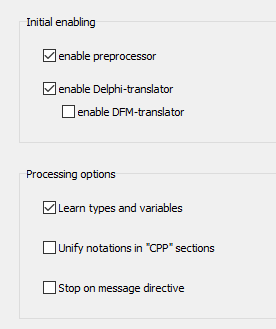User interface > Translation options > Processor options
The processor options are part of the translation options and specify the kinds of processing during the translation from Delphi to C++.

When Delphi code is translated, normally the source at first is preprocessed to remove parts of the code, which aren't defined. But it is possible too, to disable either the preprocessor or the Delphi-translator. That can be done by the according buttons in the tool bar. The initial state of these buttons after the options are loaded can be set here. When the Delphi-translator is enabled, also the DFM-translator can be enabled or disabled. (If the Delphi-translator is disabled the check-box for the dfm-translator vanishes, because the dfm files cannot be processed then.)
The overwritten System.pas gets always preprocessed, even if the option to do so is disabled.
Normally the learning option is enabled. So the variables and types of every interface are remembered, once the interface was parsed and the interface has not to be processed again. However, there are cases, that the definitions are not constant for all common interfaces. A definition of a current file might enable or disable definitions of a common file. So the result of the conditional compilation will change too and finally different types and variables might be declared of the same unit,which is used in different other units. When the learning option is disabled, included units are preprocessed for every new file again and the result will be correct for each file, but the total processing time increases very much.
The option Unify notations in "CPP" sections determines the case sensitivity in "CPP"-sections.
The option Stop on message directive determine what happens, if a message directive would remain in the pre-processed code.